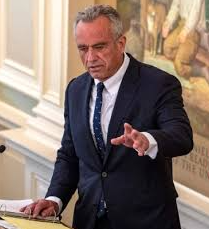Health Nominee Defends His Record Amid Strong Criticism from Democrats and Public Protests
Robert F. Kennedy Jr., nominated by President Donald Trump to head the U.S. Department of Health and Human Services, endured a tense Senate confirmation hearing on January 29, where his controversial stance on vaccines became the focal point. Democratic senators sharply criticised Kennedy for his anti-vaccine views, accusing him of perpetuating conspiracy theories that erode public confidence in essential medical treatments.
Kennedy, a well-known environmental lawyer, attempted to clarify his position, asserting that he believes in the importance of vaccines for public health and stressed that his own children have been vaccinated. “Vaccines are crucial for healthcare, and we face the highest chronic disease burden in the world,” he stated to the Senate Finance Committee.
However, his past statements, which included doubts about the safety of all vaccines, triggered backlash. Senators pointed to his history of challenging vaccine safety, as well as his past comments linking COVID-19 to racial bias and suggesting that Lyme disease may have been engineered as a bioweapon. Senator Ron Wyden accused Kennedy of dedicating his career to sowing doubts and discouraging vaccination efforts.
On the other hand, some Republican senators rallied behind Kennedy, commending his focus on addressing chronic diseases like obesity and diabetes. Senator Ron Johnson emphasised the need for a unified approach to tackle these growing health issues.
Kennedy’s potential confirmation would place him in charge of overseeing more than $3 trillion in healthcare spending, including Medicare and Medicaid, two crucial programs for millions of Americans. His confirmation would grant him considerable influence over U.S. health policy, but it remains uncertain.
During the hearing, Kennedy faced questions about his association with the Children’s Health Defense, an anti-vaccine group he founded. He distanced himself from controversial merchandise linked to the group, including baby clothes with anti-vaccine messages. Kennedy also clarified his stance on abortion rights, agreeing with Trump that states should decide on abortion access.
Protests interrupted the proceedings, with a demonstration organised by the advocacy group Protect Our Care. The protesters used mock gravestones to symbolise the risks of vaccine misinformation, referencing the 2019 measles outbreak in Samoa. Kennedy denied involvement in spreading false information about the outbreak.
The Senate Finance Committee is expected to vote on Kennedy’s nomination soon, and he will appear before a separate Senate health panel later this week. Analysts predict that there is a 50/50 chance of his confirmation. Should he be rejected, some experts believe that the biotech sector could experience significant changes, with stocks from companies like Moderna and Novavax seeing notable fluctuations.
Although the Republican-controlled Senate has not rejected any of Trump’s nominees so far, Kennedy’s confirmation remains uncertain amid growing opposition.








